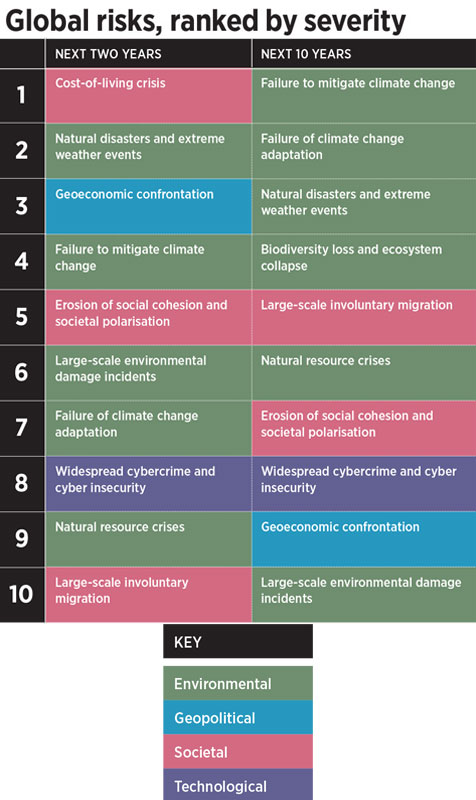Loading component...
At a glance
The annual gathering of the World Economic Forum in Davos in January 2023 marked its first full return to the Swiss resort town since the pandemic shifted the summit online.
More than 2700 leaders from 130 countries met to brainstorm solutions to today’s biggest global problems. Given the current state of the world, their first question may well have been “where do we start?”, but a buzzword soon emerged to help focus the conversations – “polycrisis”.
First coined in the 1970s, the term “polycrisis” has been popularised in recent times by English historian Adam Tooze – an attendee at this year’s summit in Davos. It describes the simultaneous, interconnected crises facing the world today.
There is the escalating climate crisis, the war in Ukraine, rising inflation, a food and energy crisis, multiple extreme weather events, a global health emergency, widespread social unease – and the list goes on.
Polycrisis is similar to “VUCA”, which stands for volatility, uncertainty, complexity and ambiguity. VUCA characterises an environment of rapid, unpredictable changes, lack of clarity, intricate interdependencies and the potential for multiple interpretations.
In a sense, polycrisis is a form of VUCA, where multiple crises contribute to a situation’s overall volatility, uncertainty, complexity and ambiguity.
While unprecedented global events prove no one can predict the future, preparing for the worst may help to address urgent problems as they emerge. Could it also help to seize the opportunities that often accompany a crisis?
When crises collide
Crises have become the new normal since COVID‑19 swept the globe.
Collins Dictionary named “permacrisis” as its 2022 word of the year. It defines the term as an “extended period of instability and insecurity, especially one resulting from a series of catastrophic events”.
A key characteristic of polycrisis is that many of the events are connected, so the overall impact is worse than the sum of its parts. The pandemic, for instance, led to more than just a health crisis. It caused supply chain disruptions, which contributed to price hikes. Governments injected more money into the economy, and consumer demand outstripped supply. Then, inflation spiked, leading to rises in interest rates. The cost of living increased, while social unrest continued to rise.
Nicki Hutley, independent economist and councillor for the Climate Council, says crises are increasing in frequency.
“We used to have more regular business cycles, and countries like Australia had a long period of wellbeing that perhaps has caught us off guard for some of these crises.
“The interconnectedness of the world and the rise of climate change, for example, just means that the number of crises seems to occur more and more often,” Hutley says.
"The most recent modelling estimates that, with the acceleration in climate change, by the time we get to 2070, we’ll be having the equivalent of a COVID‑19‑size downturn every year. That’s a decline in GDP of 7 per cent on average each year."
The Global Risks Report 2023 from the World Economic Forum describes the early 2020s as “a particularly disruptive period in human history”. The report is underpinned by the Global Risks Perception Survey, which brings together leading insights from more than 1200 experts across the World Economic Forum’s network. More than four in five respondents anticipate persistent volatility over the next two years.
While the cost‑of‑living crisis is ranked as the most severe global risk over the next two years, failure to mitigate climate change tops the list over a 10‑year period. In fact, climate‑related issues also rank in the top four longer‑term risks.
Climate risks flow right through the economy, Hutley notes. “The most recent modelling estimates that, with the acceleration in climate change, by the time we get to 2070, we’ll be having the equivalent of a COVID‑19‑size downturn every year,” she says. “That’s a decline in GDP of 7 per cent on average each year.
“We’re talking about trillions of dollars in lost economic activity over the next couple of generations as climate change worsens, if we don’t meet the Paris targets or at least get very close to them.”
Sustainability and resilience

Sustainable business practices can often help to insulate organisations from some of the worst effects of a crisis. However, some events, such as the 9/11 terrorist attacks and the Fukushima nuclear disaster, are so extreme and unexpected that preparation is impossible.
Gartner research has found that 85 per cent of investors are taking environmental, social and governance (ESG) factors into account when investing. The research has also revealed that 91 per cent of banks monitor ESG performance of investments.
Research from McKinsey has shown that a strong environmental performance can help to delay a company’s rising operating expenses, including the true costs of water, carbon and raw materials. It also reveals a significant correlation between a company’s resource efficiency and the strength of its financial performance.
However, as business leaders aim to shield their operations from economic downturn, indicators suggest ESG progress is stalling.
According to a 2022 KPMG report, 50 per cent of CEOs have paused or are reconsidering existing or planned ESG efforts. By the time of the report, 34 per cent had already done so.
Patrick Viljoen CPA, senior manager ESG at CPA Australia, says sustainability intersects with many of the current crises.
"We’ve got automation in the robotics revolution and augmented and virtual reality, which are improving the safety of workers and improving efficiency."
“A lot of organisations – and a lot of people – still view ESG as an issue on the periphery and that sustainability is not part and parcel of an organisation.
“I think organisations are still struggling to understand that you can’t view risks like climate change, water security and biodiversity loss as somehow siloed and not part of the overall risk profile,” Viljoen says.
To Viljoen, sustainability is a pillar of overall business resilience. “If you view things through a sustainability lens, it opens up your ability to recognise risks that potentially could come your way.
“If you view them purely from a financial perspective, you’ll be blindsided,” Viljoen says.
What is financially material may differ from the impending risks from climate change, for example. “It may not be financially material to you at the moment, but it is definitely coming down the line,” Viljoen explains.
Surprising positives
Despite a polycrisis, Tané Hunter, co‑founder of Melbourne‑based think tank Future Crunch, is optimistic about the state of the world. He says opportunities are already arising to alleviate the strain.
“The clean energy revolution is arguably the largest economic opportunity that we’ve seen in ages, and it’s going gangbusters around the world, especially in Australia,” Hunter says. “We’ve got automation in the robotics revolution and augmented and virtual reality, which are improving the safety of workers and improving efficiency.”

Thanks to new AI and machine learning capabilities, organisations that “get it right” have an extraordinary collection of knowledge at their fingertips.
“We’re seeing that sweeping across the developing world as well, giving people access to free online education from some of the best educational institutes in the world,” Hunter says. “We’re also seeing huge developments in biotechnology.”
Hutley agrees that economic opportunities are emerging from the climate crisis.
“In the UK, industry is worth tens of billions of pounds in the green economy.
It’s only just starting, and it’s got a growth rate of more than 10 per cent per annum.
“Look at what’s happening in the US with the Inflation Reduction Act and the amount of investment that it is promoting and stimulating. It is going to get close to a trillion dollars in the initial investment phase,” Hutley says.
There is also the prospect that addressing one overlapping challenge within a polycrisis may also help to alleviate others.
“We’ve got to think of our economy in terms of what it will become, and we have to take advantage of that,” says Hutley.
Viljoen adds that crises must be viewed from every angle and that accountants have the skills required to address the challenges.
“Accountants have an ability to view problems holistically. Dollars and cents will always be our bread and butter. However, the ability for accountants to also factor in non‑financial information and non‑financial risks and to look at the problem more broadly is a really vital skill.
“The ability to evaluate the impact of decisions over the longer term is so important, because risks like climate change aren’t going away,” Viljoen says.

